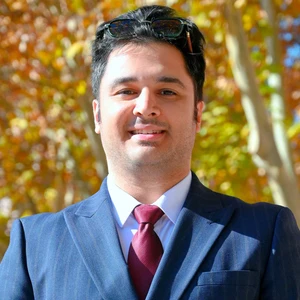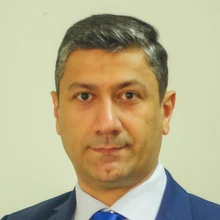Azerbaijan’s Pivotal Role within the Organization of Turkic States[Over]  By Vusal GULIYEV, Policy Advisor at the Center of Analysis of International Relations and Head of Shanghai Office at AZEGLOB Consulting Group By Vusal GULIYEV, Policy Advisor at the Center of Analysis of International Relations and Head of Shanghai Office at AZEGLOB Consulting Group
Azerbaijan’s strategic location in the South Caucasus, economic potential, and historical ties with Turkic states underscore its regional significance. Positioned as a vital energy corridor, it fosters economic diversification, infrastructure development, and diplomatic engagement with Central Asia. Azerbaijan plays a key role in regional connectivity, humanitarian initiatives, and multilateral cooperation within the Organization of Turkic States, shaping geopolitical dynamics.
Situated at the nexus of Europe and Asia, Azerbaijan’s proximity to significant energy producers and consumers has established it as a vital transit corridor for energy resources. This strategic positioning has not only reinforced Azerbaijan’s centrality in regional energy security but also facilitated avenues for collaboration and partnerships with neighbouring states. In addition to its prominence in the energy sector, Azerbaijan has pursued economic diversification, fostering expertise in fields such as advanced technology, transportation, and tourism. READ MORE
Stalemate Persists in the Armenia-Azerbaijan Peace Process[Over]
 By Vasif HUSEYNOV, PhD, Head of Department, AIR Center, Adjunct Lecturer, ADA and Khazar Universities, Baku By Vasif HUSEYNOV, PhD, Head of Department, AIR Center, Adjunct Lecturer, ADA and Khazar Universities, Baku
Armenia and Azerbaijan remain at an impasse in their ongoing peace process, facing the conditions of withdrawing international lawsuits and agreeing on a ban against third-party military forces along their border. Armenia’s constitutional claims over Karabakh and the dissolution of the OSCE Minsk Group remain sensitive topics. Azerbaijan insists on amending Armenia’s constitution to eliminate future territorial disputes, while Armenia faces legal and political hurdles in making such changes. Disagreements over reopening transportation links further hinder the peace process. Azerbaijan demands an “unimpeded” land passage to its Nakhchivan exclave via Armenia’s Meghri region, while Armenia insists on controlled transit. This unresolved dispute continues to block progress toward a final agreement. READ MORE
The U.S.-Armenia Strategic Partnership Charter: What to expect next?[Over]  By Yeghia TASHJIAN, Beirut-based regional analyst and researcher, columnist, "The Armenian Weekly” By Yeghia TASHJIAN, Beirut-based regional analyst and researcher, columnist, "The Armenian Weekly”
On January 14, 2025, as U.S. President Joe Biden’s administration breathed its last days, Armenia and the United States signed a Strategic Partnership Charter in Washington, D.C. The document was signed by Armenia’s Foreign Minister Ararat Mirzoyan and U.S. Secretary of State Antony Blinken. This article will highlight the key points of the agreement and present a reflection and analysis on how Armenia can benefit from the Charter to pursue its foreign policy goals, amid the regional reaction and the Azerbaijani president’s recent threats against Yerevan.
As per the agreement, both countries affirm the importance of their relationship as “friends and strategic partners.” They emphasize that this cooperation is based on “shared values and common interests,” which include democracy, economic freedom, sovereignty, and territorial integrity. They also aim to collaborate on innovation and technological advances, bolster energy security and strengthen their relationship in the fields of education, science, culture, rule of law, defence, and security.
READ MORE
Revitalizing the Organization of Turkic States Amid Global Unrest[Over]  By Vusal GULIYEV, Head of Shanghai Office at AZEGLOB Consulting Group and Policy Expert at the Baku-based Topchubashov Center By Vusal GULIYEV, Head of Shanghai Office at AZEGLOB Consulting Group and Policy Expert at the Baku-based Topchubashov Center
The Organization of Turkic States (OTS) has gained renewed significance amid global geopolitical unrest and economic uncertainty. As regional tensions rise, member states are leveraging shared linguistic, cultural, and historical ties to foster closer economic, political, and security cooperation. The OTS aims to enhance intra-regional trade, energy collaboration, and collective resilience, positioning itself as a key player in stabilizing and advancing the interests of the Turkic world in an increasingly volatile global landscape.The recent regional events and the geopolitical consequences of the Russo-Ukrainian war have had a profound impact on the dynamics among Türkiye, Azerbaijan, and the Central Asian Turkic states (Kazakhstan, Uzbekistan, and Kyrgyzstan). This shifting geopolitical landscape has been the catalyst of collaboration and integration for these countries under the Organization of Turkic States (OTS), an intergovernmental organization that aims to foster cooperation among Turkic-speaking nations. READ MORE
Georgia’s Post-Election Turmoil: Scenarios for the Future and Regional Consequences[Over]  By Eugene KOGAN, Tbilisi-based defence and security expert By Eugene KOGAN, Tbilisi-based defence and security expert
Georgian parliamentary elections on 26 October 2024 have been highly contested with the opposition claiming that their win was stolen from them by the incumbent Georgian Dream party. As a result, the opposition initiated a legal procedure, demanded new elections and started peaceful protests against the election result, apparently to no avail. On 16 November, Georgia’s Central Election Commission validated the results of October’s highly contested elections, despite weeks of protests by the opposition and accusations of widespread fraud and Russian interference that were refuted by the Kremlin. This AIES Comment provides a perspective based on a combination of issues that highlight not just a divided but also a traumatised Georgian society that remembers the August 2008 war and is not ready to fight Russia again nor to deal with potential Russian interference.
READ MORE
Will the Fire of the Middle East Expand to the South Caucasus?[Over]  By Yeghia TASHJIAN, Beirut-based regional analyst and researcher, columnist, "The Armenian Weekly” By Yeghia TASHJIAN, Beirut-based regional analyst and researcher, columnist, "The Armenian Weekly”
When on November 24, a U.S.-mediated ceasefire was brokered between Lebanon and Israel, many did not imagine that within days the Turkish-backed Syrian rebel factions would storm Aleppo and capture the city in less than 36 hours. There are a lot of questions about the preparation and readiness of the Syrian army. However, it was clear that the current status quo under President Bashar al-Assad would not be preserved for a long time, as the country was fragmented and in need of conflict resolution, not conflict management. Since the same regional actors involved in the South Caucasus — Iran, Russia, and Turkey — are also in Syria supporting opposite sides, there are concerns that the fire may expand beyond the Middle East. On November 29, the former al-Qaida associated group currently branded as ‘Hai’at Tahrir al-Sham’ (HTS) along with armed factions from the Turkish-backed ‘Syrian National Army’ (some of whom fought as mercenaries against Armenians in the 2020 war in Artsakh) and some mercenaries from Central Asia and the Caucasus entered the second largest city of Syria.
READ MORE
The support of UN member states for Uzbekistan's initiatives is the result of systemic reforms in the country[Over]  Gayrat Khonnazarov, Editor-in-Chief, UzA news agency
Gayrat Khonnazarov, Editor-in-Chief, UzA news agency
The Republic of Uzbekistan has demonstrated significant success in the international arena, strengthening its active participation in the United Nations (UN) and its specialized agencies. In 2024, the country achieved a number of key milestones that underline its commitment to universal principles and standards in the areas of human rights, socio-economic development, labor, and global cooperation.
READ MORE
- December 27, 2024 19:35PM
Uzbekistan: Development of Culture – A Key Tool for Preserving National Identity[Over]  Ozodbek Nazarbekov, Minister of Culture of the Republic of Uzbekistan
Ozodbek Nazarbekov, Minister of Culture of the Republic of Uzbekistan
Culture and art are the foundation of civilization, national identity, and spiritual perfection, as well as important indicators of a country’s progress. The development of these spheres, reflecting the spiritual growth of the people, their past, present, and future, requires an approach that meets the demands of the times. This is why the reforms aimed at the development of culture and art in Uzbekistan carry profound meaning and are entering a new phase.
READ MORE
- December 20, 2024 09:03AM
Armenia’s Constitutional Catch-22[Over]  By Tabib Huseynov, independent policy analyst and researcher By Tabib Huseynov, independent policy analyst and researcher
In October 2024, the presidents of Armenia and Azerbaijan simultaneously approved a Protocol regulating the joint work of their respective border delimitation commissions. Originally signed in August, this Protocol sets the legal and procedural framework for the subsequent border delimitation process between the two South Caucasus neighbours, who have been locked in a territorial dispute for over three decades. The protocol’s enactment in both countries became possible after Armenia’s Constitutional Court issued a landmark Decision No. 1749 on 26 September 2024, confirming that the border delimitation agreement complied with Armenia’s Constitution. As border delimitation is a key issue in the post-war normalization process between Armenia and Azerbaijan, this favourable decision was widely anticipated. However, the Court’s Decision is remarkable not for its outcome, but rather its legal rationale, which traps Armenia in a legal and political Catch-22. READ MORE
- December 13, 2024 10:42AM
China and the South Caucasus[Over]  By Benyamin POGHOSYAN, PhD, Chairman, Center for Political and Economic Strategic Studies By Benyamin POGHOSYAN, PhD, Chairman, Center for Political and Economic Strategic Studies
China is a relatively new player in the South Caucasus but has growing interests, particularly in the economic domain. While Beijing established diplomatic ties with Armenia, Azerbaijan, and Georgia in the early 1990s, it largely stayed out of the region’s geopolitics. Armenia acquired Chinese-made WM-80 multiple-launch systems in 1999, but they had little impact on the military balance with Azerbaijan. Chinese economic ties with the South Caucasus began to grow in the early 2000s, driven by the rapid expansion of its economy. Interest in the region deepened after President Xi Jinping announced the Belt and Road Initiative in 2013, with the South Caucasus envisioned as a potential land route connecting China to Europe.
READ MORE
- December 13, 2024 10:30AM
Georgia’s Post-Election Turmoil: Scenarios for the Future and Regional Consequences[Over]  By Eugene KOGAN, Tbilisi-based defence and security expert By Eugene KOGAN, Tbilisi-based defence and security expert
Georgian parliamentary elections on 26 October 2024 have been highly contested with the opposition claiming that their win was stolen from them by the incumbent Georgian Dream party. As a result, the opposition initiated a legal procedure, demanded new elections and started peaceful protests against the election result, apparently to no avail. On 16 November, Georgia’s Central Election Commission validated the results of October’s highly contested elections, despite weeks of protests by the opposition and accusations of widespread fraud and Russian interference that were refuted by the Kremlin. This AIES Comment provides a perspective based on a combination of issues that highlight not just a divided but also a traumatised Georgian society that remembers the August 2008 war and is not ready to fight Russia again nor to deal with potential Russian interference.
READ MORE
- December 13, 2024 10:12AM
Multiple Countries Strive to Enhance Middle Corridor Despite Challenges[Over]  By Vasif HUSEYNOV, PhD, Head of Department, AIR Center, Adjunct Lecturer, ADA and Khazar Universities, Baku By Vasif HUSEYNOV, PhD, Head of Department, AIR Center, Adjunct Lecturer, ADA and Khazar Universities, Baku
On October 3, Ashgabat, Turkmenistan hosted a high-level event in collaboration with the European Union, the Central Asian countries located along the Trans-Caspian Transport Corridor (also known as the Middle Corridor), the South Caucasus states, and Türkiye, as well as the major international financial institutions. The event resulted in the establishment of a Coordination Platform for the Middle Corridor. According to the European Union, the Coordination Platform will focus on promoting the transit corridor and implementing priority infrastructure projects while coordinating investments in the South Caucasus and Türkiye. The European Union announced plans to launch a regional transport program in 2025 to support infrastructure development and provide technical assistance for improving standards, digitalization, and interoperability across the region. The Middle Corridor is an essential route that will allow Central Asia to better access Europe without having to go through sanctioned Russia, but it still faces numerous economic, logistical, and political roadblocks in its development.
READ MORE
- December 13, 2024 10:12AM
The Future of Regional Corridors in the Middle East and India’s Role[Over]  By Yeghia TASHJIAN, Beirut-based regional analyst and researcher, columnist, "The Armenian Weekly” By Yeghia TASHJIAN, Beirut-based regional analyst and researcher, columnist, "The Armenian Weekly”
With the future of key connectivity projects at stake, India must step up as a reliable mediator as the war in the Middle East escalates.
On 7 October 2023, Hamas launched the “al Aqsa Storm” operation against Israel, triggering a series of retaliatory military actions from both sides. Iran-backed groups such as Hezbollah in Lebanon and militias in Yemen also became involved, further escalating the conflict. With rising regional tensions and direct involvement from both Israel and Iran, instability across the Middle East has intensified. This conflict will also impact the future of economic corridors in the region in which India invests. In this context, the future of two important corridors—the International North–South Transport Corridor (INSTC) and the India-Middle East-Europe Corridor (IMEC)— is at stake. India initiated both corridors, emerging as a rising power in Eurasia.
READ MORE
Implications of the US Presidential Elections for the South Caucasus [Over]  By Benyamin POGHOSYAN, PhD, Chairman, Center for Political and Economic Strategic Studies By Benyamin POGHOSYAN, PhD, Chairman, Center for Political and Economic Strategic Studies
As the US presidential elections approached, pundits and politicians worldwide sought to predict the outcome and explore scenarios for US foreign policy under Kamala Harris or Donald Trump. This was unsurprising: Despite the end of the unipolar world order and significant shifts in the global balance of power, the United States remains the superpower capable of global influence. The South Caucasus was no exception, as pundits debated the potential implications of the election results for the region. The uncertainty ended on November 5, as Donald Trump secured his return to the White House in January 2025. What might the South Caucasus expect from Trump’s second presidency?
READ MORE
Armenia’s Constitutional Court Dismantles One Barrier to Peace with Azerbaijan, While Erecting Others[Over]  By Tabib Huseynov, independent policy analyst and researcher By Tabib Huseynov, independent policy analyst and researcher
In a move that has left many in Armenia, Azerbaijan, and beyond scratching their heads, the Armenian Constitutional Court adopted on September 26 a landmark ruling No. 1749, greenlighting the border delimitation process with Azerbaijan. The text of the ruling (henceforth referred to as Ruling 1749 or simply, the ruling) was published three days later over the weekend, which invites questions about whether this delay was intended to minimize scrutiny as the initial news cycle on the decision faded and public attention shifted elsewhere. Some Armenian commentators hailed the ruling, claiming it invalidates Baku's criticism that Armenia's Constitution harbours territorial claims against Azerbaijan. On October 4, Armenian foreign ministry spokesperson Ani Badalyan echoed this argument, claiming the ruling proves Armenia’s Constitution contains no territorial claims. READ MORE
- November 21, 2024 08:58AM
The Geopolitical Future of the South Caucasus[Over]  Benyamin POGHOSYAN, PhD, Chairman, Center for Political and Economic Strategic Studies Benyamin POGHOSYAN, PhD, Chairman, Center for Political and Economic Strategic Studies
APRI Armenia, in cooperation with the Friedrich Naumann Foundation for Freedom Yerevan Office, conducted a research project from July to September 2024 to assess the geopolitical future of the South Caucasus. The report analysed the primary external factors influencing regional geopolitics. It assessed possible future developments in the South Caucasus, focusing on Armenian foreign policy diversification, the prospects of Armenia–Azerbaijan negotiations, the possible future of Georgian foreign policy, and Azerbaijan’s quest for a new foreign policy vision after the military takeover of Nagorno-Karabakh and the forced displacement of its Armenian population in September 2023.
READ MORE
- November 21, 2024 08:47AM
Parliamentary Elections in Georgia: Why Do They Matter for Armenia?[Over]  Benyamin POGHOSYAN, PhD, Chairman, Center for Political and Economic Strategic Studies Benyamin POGHOSYAN, PhD, Chairman, Center for Political and Economic Strategic Studies
On October 26, 2024, parliamentary elections were held in Georgia. Long before election day, they were called the most crucial Georgian elections since the 2003 Rose Revolution. Opposition parties presented the election as a choice between Russia and Europe, while the ruling Georgian Dream Party described it as a choice between peace and war. In both cases, geopolitics played a significant role.
The opposition accused the Georgian Dream of steering Georgia away from European integration. At the same time, the government claimed that the opposition sought to open a second front against Russia, transforming Georgia into another Ukraine. Georgian Dream even displayed posters on Tbilisi streets contrasting images of a peaceful Tbilisi with war-ravaged Ukrainian cities. Recent actions by the Georgian government, including the passage of a law on transparency of foreign influence and an anti-LGBT propaganda law, have strained Georgia’s relations with the West. The European Union halted the accession process and cancelled funding from the European Peace Facility, while the United States imposed sanctions on several Georgian officials.
READ MORE
- November 13, 2024 23:27PM
Uzbekistan on the way to a sustainable future: environmental initiatives and international cooperation[Over]  On November 11-13, President of Uzbekistan Shavkat Mirziyoyev is taking part in the World Summit on Combating Climate Change at the 29th session of the Conference of the Parties to the UN Framework Convention on Climate Change, which will be held in Baku.
On November 11-13, President of Uzbekistan Shavkat Mirziyoyev is taking part in the World Summit on Combating Climate Change at the 29th session of the Conference of the Parties to the UN Framework Convention on Climate Change, which will be held in Baku.
Delegations from almost 200 countries at the level of heads of state, government and ministers, representatives of international organizations, NGOs, expert, scientific and social circles are expected to participate in the conference. READ MORE
- November 12, 2024 07:25AM
Azerbaijan Applies for BRICS Membership[Over]  By Vasif HUSEYNOV, PhD, Head of Department, AIR Center, Adjunct Lecturer, ADA and Khazar Universities, Baku By Vasif HUSEYNOV, PhD, Head of Department, AIR Center, Adjunct Lecturer, ADA and Khazar Universities, Baku
On August 20, the Ministry of Foreign Affairs of Azerbaijan declared the country had officially applied for membership in BRICS. BRICS is an intergovernmental cooperation platform that originally comprised Brazil, Russia, India, China, and South Africa, and now includes five new members that include Saudi Arabia, Egypt, Ethiopia, Iran, and the United Arab Emirates. This announcement followed Azerbaijan’s initial declaration of its desire to join the bloc, revealed in the China-Azerbaijan joint declaration on establishing a strategic partnership. This was adopted by the two countries’ leaders on July 3 during the Shanghai Cooperation Organization (SCO) Summit in Astana, Kazakhstan. The declaration highlights Azerbaijan’s intent to join BRICS and emphasizes China’s support for this initiative. Azerbaijan’s bid has also been backed by Russia, with the Kremlin expressing support for Baku’s application on several occasions over the past two months.
READ MORE
From Armenia to the EU: Stay Strong on the South Caucasus[Over]   By Anahide PILIBOSSIAN, Vice President of Strategy and Development, APRI Armenia By Anahide PILIBOSSIAN, Vice President of Strategy and Development, APRI Armenia
Benyamin POGHOSYAN, PhD, Chairman, Center for Political and Economic Strategic Studies
The events of the year 2022 led the European Union to build up its foreign and security policy efforts. Its unprecedented actions in the South Caucasus since then include: The EU and Azerbaijan signed a Memorandum of Understanding on a Strategic Partnership in the Field of Energy in July 2022; in late 2022, a short-term EU civilian observer mission was established in Armenia (despite Armenia being a member of the Collective Security Treaty Organization [CSTO]), followed by a two-year mission, the EU Mission to Armenia, in February 2023; a new Partnership Agenda was announced in February 2024; Georgia received EU candidate status in December 2023; European Council President Charles Michel initiated the Brussels format to facilitate peace negotiations between Armenia and Azerbaijan.
While the EU’s intention of being a constructive neighbour and a foreign policy powerhouse in the region is commendable, regional events have stress-tested its strength, signalling the limits of its engagement.
READ MORE
Putin’s Visit to Baku Stirs up Iran-Russia Tensions on Zangezur Corridor[Over]  By Vasif HUSEYNOV, PhD, Head of Department, AIR Center, Adjunct Lecturer, ADA and Khazar Universities, Baku By Vasif HUSEYNOV, PhD, Head of Department, AIR Center, Adjunct Lecturer, ADA and Khazar Universities, Baku
On August 18–19, Russian President Vladimir Putin paid a two-day visit to Azerbaijan. This marked the first state visit by a Russian president to the South Caucasian republic and only the second visit in the bilateral relationship since former Azerbaijani President Heydar Aliyev’s trip to Moscow in 2002. Contrary to expectations from local observers, the visit did not yield any significant agreements or binding political and economic arrangements. A few announcements were made regarding future joint initiatives, including cooperation on food security, labour inspections, the establishment of a Russian-Azerbaijani university, and the joint production of oil tankers. An agreement was also reached to expand the partnership between Russia’s public joint-stock company (PJSC) Gazprom and the State Oil Company of the Republic of Azerbaijan (SOCAR) . Gazprom CEO Alexey Miller revealed that the two sides agreed to broaden their “multifaceted strategic partnership,” particularly concerning the International North-South Transportation Corridor (INSTC) project. He also mentioned the planned signing of a comprehensive scientific and technical cooperation program in September. While few details were disclosed, this marked their first public reference to the INSTC project, about which little is currently known. Putin’s visit to Azerbaijan demonstrates how Russia seeks to maintain its influence in the region, which could lead to neighbouring states, such as Iran and Armenia, feeling threatened.
READ MORE
Is the Balkan Region Israel’s Newfound Interest?[Over]
 By Fuad Shahbazov, Baku-based independent regional security and defence analyst By Fuad Shahbazov, Baku-based independent regional security and defence analyst
Israeli President Isaac Herzog concluded his historic first visit to Albania in September, shortly after his first-ever trip to Serbia, where both sides agreed to deepen bilateral cooperation amid Israel's extending military campaign against Hamas and Hezbollah in Southern Lebanon. Although the recent intensive diplomatic dialogue between Israel and Balkan states is gaining more impetus, it is not a new phenomenon. In the last five years, much has been done to ensure Israel’s expanding diplomatic, security, and economic ties with the Balkans, particularly with Albania and Serbia. In light of the worsening geopolitical tensions in the Middle East after the Hamas attack on Israel in October 2023 and Israel’s large-scale military campaign in Gaza and Southern Lebanon, Tel Aviv sought to build new alliances and partnerships at a critical time. READ MORE
The issue of the “Zangezur Corridor” is back — can Iran provide an alternative?[Over]  By Yeghia TASHJIAN, Beirut-based regional analyst and researcher, columnist, "The Armenian Weekly” By Yeghia TASHJIAN, Beirut-based regional analyst and researcher, columnist, "The Armenian Weekly”
On August 7, 2024, Elchin Amirbayov, President Ilham Aliyev’s senior envoy for special assignments, told Radio Free Europe/Radio Liberty that Baku had agreed to withdraw the issue of the “Zangezur Corridor” from Armenia-Azerbaijan negotiations and “refer it to a later stage.” This statement put Russia in a difficult position, as it had aimed to control the transit routes between Armenia and Azerbaijan, according to the November 10, 2020 trilateral statement signed by the heads of state of Armenia, Azerbaijan and Russia. As such, Russia attempted to revive the issue but met Iranian opposition. This article will highlight U.S. involvement in containing Russia’s influence in the South Caucasus, Russia’s objective behind bringing back the corridor issue and Tehran’s harsh stance against Moscow.
READ MORE
|
|